It was a decade ago that I met Richard Feynman when I happened to be casually spending some time at a library. My reason for being there was to peacefully watch the rain behind the comfort of one of the library windows. The library was indeed a perfect location for this purpose of mine, and as the rain began to subside, my eyes wandered over the book which I had selected purely for the sake of its beautiful cover and title. As I quickly skimmed over its pages, I noticed a particularly interesting sentence at the bottom of one page: "I have to understand the world, you see."
That was a rare moment where I found myself saying "aha" as I was ecstatic with this remarkable discovery. In my excitement, I had wished to order a round of tea for all of the patrons of the library and endlessly speak to them about the book which I held in my hands and its author, Richard Feynman.

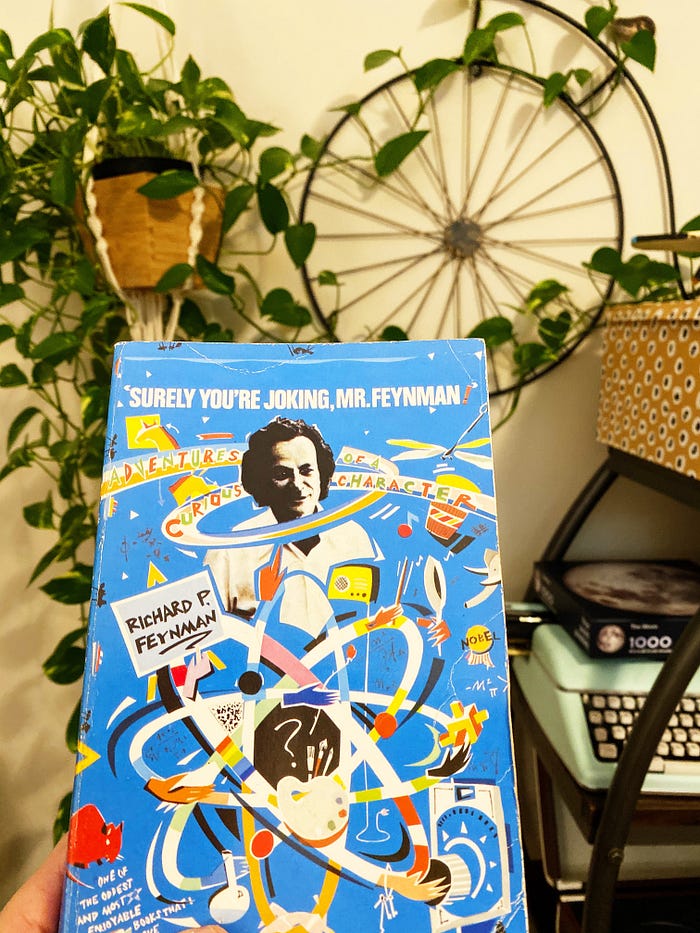
I, unfortunately, met Richard Feynman later than I would've liked, as no one had mentioned him to me until that point. That is why I wished to close this metaphorical gap by reading all of his works that I could get my hands on, as well as watching all documentaries pertaining to him and interviews with him. I wanted to see the world through his eyes.
Even today, whenever my life's joy takes a slight dip, I turn back and take yet another look at Feynman's comments on life in order to regain my felicity. Yes, it's his ability to put the utmost passion, zeal, and excitement into mentioning even the simplest things in life which revive me, probably since emotions are contagious.
Feynman had the rare and unique ability to take a very different look at seemingly even the most basic of things, such as, at times, the hundreds or thousands of flowers we pass by on the road. As an example of this, during a joint interview with one of his friends who is an artist on the BBC program titled "Horizon," it is possible to look at his comments and really understand his perspective:
"I have a friend who's an artist that has sometimes taken a view of which I don't agree with very well. He'll hold up a flower and say, 'Look how beautiful it is,' and I'll agree. Then he says, 'I, as an artist, can see how beautiful this is, but you, as a scientist, take this all apart, and it becomes a dull thing,' And I think that he's kind of nutty. First of all, the beauty that he sees is available to other people and me, too, I believe. I can appreciate the beauty of a flower. At the same time, I see much more about the flower than he sees. I could imagine the cells in there, the complicated actions inside, which also have beauty. I mean, it's not just beauty at this dimension, at one centimeter; there's also beauty at smaller dimensions, the inner structure, also the processes. The fact that the colors in flowers evolved to attract insects to pollinate them is interesting; it means that insects can see the color. It adds a question: Does this aesthetic sense also exist in the lower forms? Why is it aesthetic? All kinds of interesting questions which the science knowledge only adds to the excitement, the mystery, and the awe of a flower. It only adds. I don't understand how it subtracts."
Today, we call that monologue Feynman's "Ode to the Flower."
Furthermore, I had once encountered a cute animation by the creative designer Fraser Davidson, who had used his amazing art to embellish Feynman's words, which were already of extremely high quality and elegance. Simply put, it was stunningly beautiful, and I humbly extend my congratulations to him.
All physicists who produce something of benefit for mankind are special individuals. However, Richard Feynman can be said to hold a place even more special than that of physicists.
Richard Feynman was the type of person who would play the bongo or draw people that he saw on pieces of paper in his pocket to clear his mind after simplifying some of the most complicated topics in the world. Editors of Abackus.com have compiled many of his drawings here. I highly suggest you check them out.
This can be solely attributed to the sense of humor he possessed as well as his eccentric nature. It wasn't difficult to notice that he used his expansive intelligence to simply have fun. Yes, Feynman dabbled in physics purely for the sake of entertainment. He had decided to go down this route in a bid to come out of the state of depression he had fallen into following the passing of his wife, Arline Greenbaum, where he found himself no longer able to enjoy life. He describes how he came to this decision on page 157 of his book titled Surely You're Joking, Mr. Feynman:
- So I got this new attitude. Now that I am burned out, and I'll never accomplish anything, I've got this nice position at the university teaching classes which I rather enjoy, and just like I read the Arabian Nights for pleasure, I'm going to play with physics, whenever I want to, without worrying about any importance whatsoever.
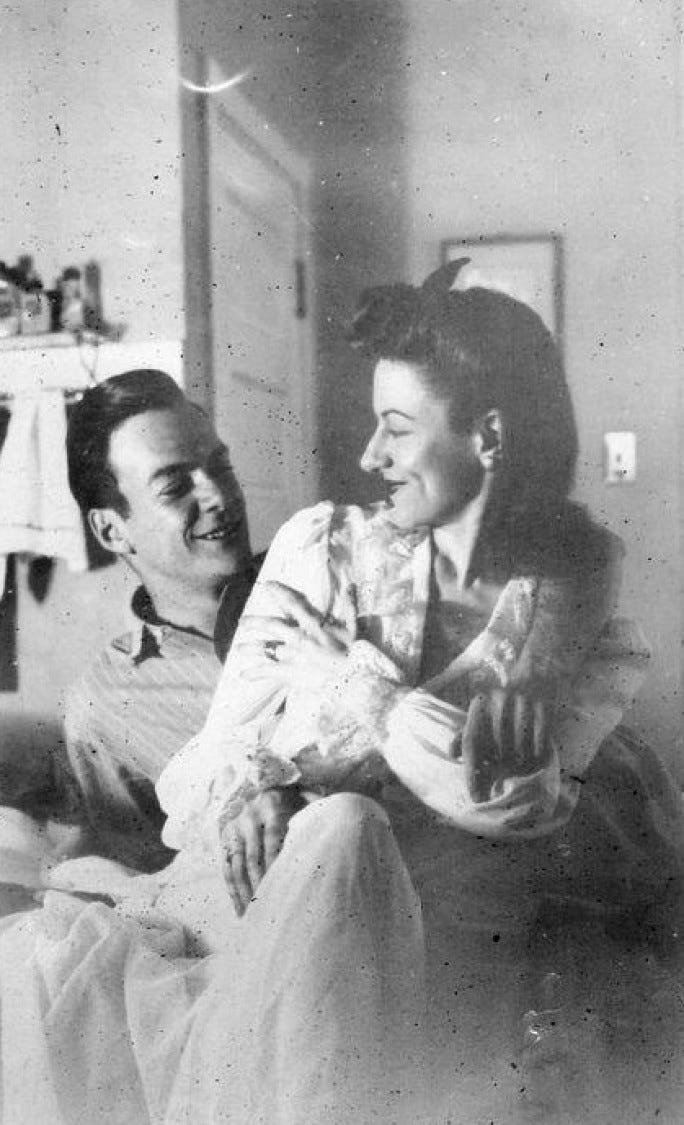
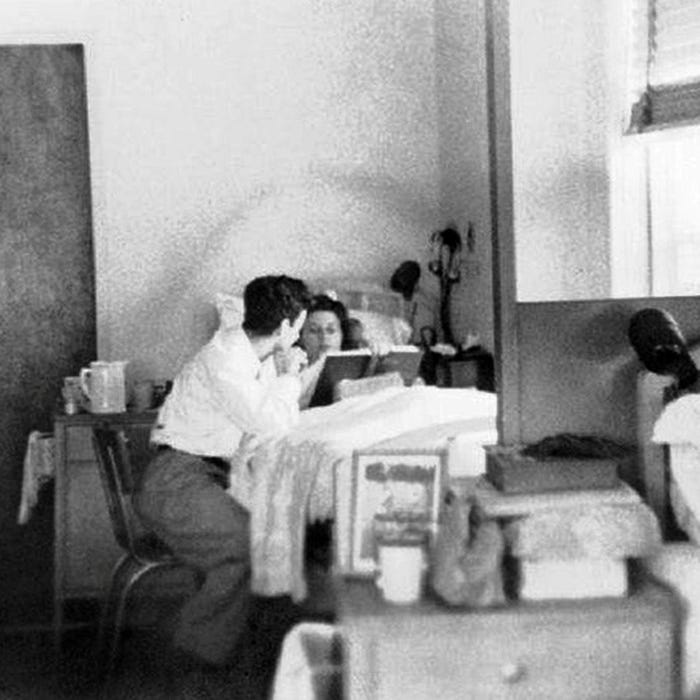
This decision was a turning point for him as he became a man who was able to use physics to understand the world and put what he understood into terms that enabled those around him to understand it as well. That is why when he discovered this ability, he spectacularly expressed it by saying: "If we have understood the essence of something, we can explain it on all levels."
Feynman identified himself as a man who was generally curious about anything and everything. His father had taught him to harbor a positive curiosity towards his environment. When strolling through a park one day, his father pointed out a bird and said:
"See that bird? What kind of bird is that? It's Spencer's warbler. Well, in Italian, it's a Chutto Lapittida. In Portuguese, it's a Bom da Peida. In Chinese, it's a Chung-long-tah, in Japanese, it's a Katano Tekeda. You can know the name of that bird in all the languages of the world, but when you're finished, you'll know absolutely nothing about the bird. You'll only know about humans in different places, and what they call the bird. So let's look at the bird and see what it's doing — that's what counts."
That is why Richard Feynman wasn't speaking nonsense when he stated that he must understand the world around him. For example, when sitting at a cafeteria for lunch, he notices some children throwing around a plate and finds himself enjoying the physics related to it. The operations he made that day would get him interested in quantum mechanics again. Furthermore, he would later receive a Nobel prize for his work in quantum mechanics. In one of his interviews, Feynman recalls that day as follows:
"When I was eating lunch, some kids threw a blue medallion on the plate of the Cornell sign in the cafeteria. When the plate came down, it wobbled , nd the blue thing went around like this. And I wondered what the relation was between the tubes. I was just playing. So I played around with the equations of motion of the rotating these, and I kept continuing to play with it. This rotation led me to a similar problem of the rotation of the spin of an electron according to Dirac's equation. And that just led me back into quantum electrodynamics. Everything just poured out."
Richard Feynman had incredible ideas about the life we live. The assumptions he would make for the future in everyday life would later become true. At his There is Plenty of Room at the Bottom lecture at the American Physical Society in Pasadena, he would talk about some of his predictions. For example, he would say the following about how the computers of his time were too large and that they needed to be made smaller:
"I don't know how to do this on a small scale in a practical way, but I do know that computing machines are very large; they fill rooms. Why can't we make them very small, make them of little wires, little elements — and by little, I mean little? For instance, the wires should be 10 or 100 atoms in diameter, and the circuits should be a few thousand angstroms across."
Everybody who has analyzed the logical theory of computers has come to the conclusion that the possibilities of computers are very interesting — if they could be made to be more complicated by several orders of magnitude. If they had millions of times as many elements, they could make judgments. They would have time to calculate what is the best way to make the calculation that they are about to make. They could select the method of analysis which, from their experience, is better than the one that we would give to them. And in many other ways, they would have new qualitative features.
If I look at your face, I immediately recognize that I have seen it before. (Actually, my friends will say I have chosen an unfortunate example here for the subject of this illustration. At least I recognize that it is a man and not an apple.) Yet there is no machine that, with that speed, can take a picture of a face and say even that it is a man; and much less that it is the same man that you showed it before — unless it is exactly the same picture.
If the face is changed; if I am closer to the face; if I am further from the face; if the light changes — I recognize it anyway. Now, this little computer I carry in my head is easily able to do that. The computers that we build are not able to do that. The number of elements in this bone box of mine is enormously greater than the number of elements in our "wonderful" computers. But our mechanical computers are too big; the elements in this box are microscopic. I want to make some that are submicroscopic.
If we wanted to make a computer that had all these marvelous extra qualitative abilities, we would have to make it, perhaps, the size of the Pentagon. This has several disadvantages. First, it requires too much material; there may not be enough germanium in the world for all the transistors which would have to be put into this enormous thing.
There is also the problem of heat generation and power consumption; TVA would be needed to run the computer. But an even more practical difficulty is that the computer would be limited to a certain speed. Because of its large size, there is finite time required to get the information from one place to another. The information cannot go any faster than the speed of light — so, ultimately, when our computers get faster and faster and more and more elaborate, we will have to make them smaller and smaller.
But there is plenty of room to make them smaller. There is nothing that I can see in the physical laws that say computer elements cannot be made enormously smaller than they are now. In fact, there may be certain advantages.
At one point in his talk, he mentioned how computers needed to distinguish people in a photograph. Years later, this process would be coined and achieved under the name "Digital Image Processing."
Many of Feynman's talks and the lessons he gave are incredibly valuable. He had a special knack for teaching, making him an incredible physics teacher. His approach to physics and his teaching style was mesmerizing. For many, he was able to picture incredibly complex physical occurrences in a manner that anyone could understand. He seemed to have made it his duty to explain the most complicated of subjects.
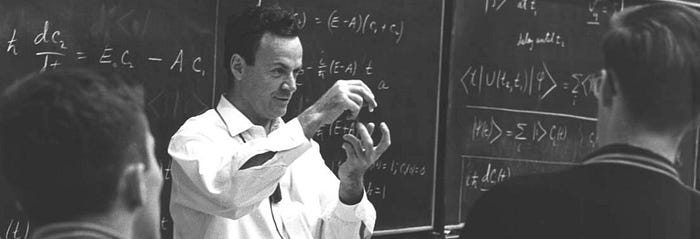
For example, in his latest book, "Feynman's Lost Lesson," he describes the complex orbit that planets take using Euclidean Geometry. When you consider that Euclidean Geometry is taught in middle school, it is clear the scale of Feynman's achievement. When explaining how magnets attract each other, for example, you can see that he is describing the universe's mechanics in a simplified manner. For another example, you can see how he can explain how a fire is formed in the video below.
"The atoms like each other to different degrees. Oxygen, for instance, in the air, would like to be next to carbon, and if they get near to each other, they snap together. If they're not too close, though, they repel, and they go apart, so they don't know that they could snap together.
It's just as if you had a ball, it was trying to climb a hill, and there was a hole it could go into, like a volcano hole, a deep one. It's rolling along, it doesn't go down in the deep hole because if it starts to climb the hill and then rolls away again. But if you make it go fast enough, it will fall into the hole.
And so, if you set something like wood and oxygen, there's carbon in the wood from the tree, and the oxygen comes and hits it, the carbon, but not hard enough, it just goes away again, the air is always coming, nothing is happening.
If you can get it faster by heating it up somehow, somewhere, or somehow, get it started, a few of them come fast, they go over the top, so to speak, they come close enough to the carbon and snap-in, and that gives a lot of jiggly motion, which might hit some other atoms, making those go faster, so they can climb up and bump against other carbon atoms, and they jiggle, and they make them others jiggle, and you get a terrible catastrophe, which is one after the other all these things are going faster and faster and snapping in and the whole thing is changing. That catastrophe is a fire.
It's just a way of looking at it, and these are happening, they're perpetual, once they get started, it keeps on going, the heat makes the other atoms capable of reaching to make more heat, to make other atoms and so on. So this terrible snapping is producing a lot of jiggling, and if I put, with all that activity of the atoms there and I put a cup of coffee over that massive wood, that's going this, it's going to get a lot of jiggling. So that's what the heat of the fire is. And then, of course, if; you see this is what happens when you start it like it just goes on and on
Wonder where, how they get started, why is that the wood has been sitting around all this time with the oxygen all this time, and it didn't do this earlier or something? Where did I get this from? Well, it came from a tree. And the substance of the tree is carbon, and where did that come from? That comes from the air, and it's carbon dioxide from the air.
People look at trees, and they think it comes out of the ground. The plants grow out of the ground. But if you ask where the substance comes from? You find out where does it come from, and trees come out of the air? They surely come out of the — no, they come out of the air.
The carbon dioxide in the air goes into the tree, and that changes it, kicking out the oxygen, pushing the oxygen away from the carbon, and leaving the carbon substance with water. Water comes out of the ground, you see, only how that getting there came out of the air, didn't it? It came down from the sky. So, in fact, most of the tree, almost all of the tree, is out of the ground. I'm sorry, it's out of the air. There's a little bit from the ground, some minerals, and so forth.
Now, of course, I told you the oxygen, and we know that oxygen and carbon stick together very tight. How is it that the tree is so smart as to manage to take the carbon dioxide, which is the carbon and oxygen nicely combined, and undo that so easily? Ah, life. Life has some mysterious force.
No, the sun is shining, and this is sunlight that comes down and knocks this oxygen away from the carbon, so it takes sunlight to get the plant to work. And so the sun, all the time, is doing the work of separating the oxygen away from the carbon, the oxygen is some kind of terrible by-product, which it spits back into the air and leave in the carbon and water and stuff to make the substance of the tree. And then we take the substance of the tree and stick it in the fireplace. All the oxygen made by these trees and all the carbon would much prefer to be close together again.
Next question, how is the sun so jiggly, so hot? I got to stop somewhere. I leave you something to imagine."
All of his lessons were recorded very intricately because not everyone could technically take them. Therefore, there had to be a way for his classes to reach everyone. It is possible to find many of his lessons online today, whether in audio or video format. Caltech University actually organized a dedicated website for all of its lectures. You can find them at Feynman Lectures — Caltech. Many of those lectures have been written down and turned into a three-book series called "The Feynman Lectures on Physics." I recommend them to anyone who enjoys physics.
Richard Feynman was closely interested in whether or not his students were learning. He not only wanted his students to learn but for all students to learn. For example, shortly after deciding to become a guest teacher in Brazil to teach others his knowledge, he started learning Portuguese. That is because he thought that a student could best learn in their mother tongue. This was a beautiful approach. His not knowing Portuguese wasn't a con for him. Furthermore, he didn't have to relearn Physics lessons in Portuguese. However, he was a teacher that genuinely cared about his students' education and one that gave them the necessary respect.
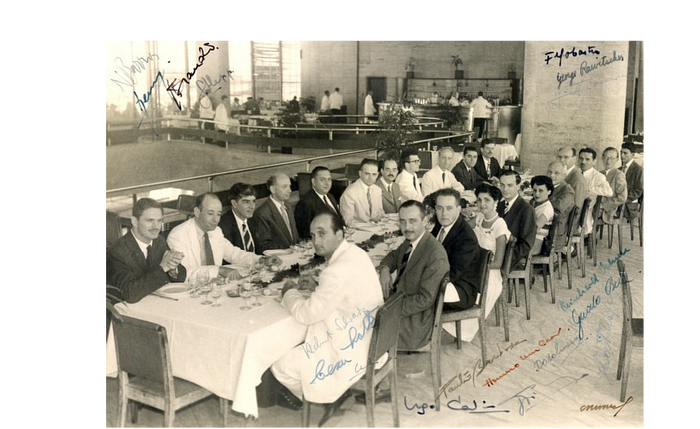
Feynman's only addition to the Brazilian education system wasn't his lectures either. During his one-year stay, he started to observe and note the fundamental setbacks of the education system in the country. For example, to the observation that, although students in Brazil start learning Physics at a much younger age, there are fewer famous Brazilian physicists, he concluded:
By flipping the pages at random, putting my finger in, and reading the sentences on that page, I can show you what's the matter — how it's not science but memorizing in every circumstance. Therefore I am brave enough to flip through the pages now, in front of this audience, to put my finger in, to read, and to show you. So I did it. I stuck my finger in, and I started to read: "Triboluminescence. Triboluminescence is the light emitted when crystals are crushed." I said, "And there, have you got science? No! You have only told what a word means in terms of other words. You haven't said anything about nature — what crystals produce light when you crush them, why they produce light. Did you see any students go home and try it? He can't. "But if, instead, you were to write, 'When you take a lump of sugar and crush it with a pair of pliers in the dark, you can see a bluish flash. Some other crystals do that too. Nobody knows why. The phenomenon is called "triboluminescence." 'Then someone will go home and try it. Then there's an experience of nature."
For other educators to also be able to implement these observations, he summarized his experiences into seven items:
• Don't just teach your students to read.
• Teach them to question what they read and what they study.
• Teach them to doubt.
• Teach them to think.
• Teach them to make mistakes and learn from them.
• Teach them how to understand something.
• Teach them how to teach others.When Feynman's supernatural observational skills combined with his great problem-solving ability, there were very rational outcomes. For example, when he craved something sweet one day, he came up with a brilliant solution to the ever-lingering question of "What should I eat" by deciding to only eat chocolate ice cream as dessert for the rest of his life. While Feynman's solution might not be suitable for everyone, it is a brilliant solution when you look further.
In 1978, when the surrounding area of his forest house in Altadena experienced a fire, he insured his home for flood protection. This action of his puzzled others as there was no river near his house. However, in 1979, the area experienced heavy rains, and many houses experienced flood damage resulting from landslides. His incredible physics knowledge and observational skills helped him take the necessary precautions.
He would also give insightful advice to those he would meet. When Pulitzer Prize winner Herman Wouk decided to write a book about World War II, he wanted to interview Richard Feynman. That was because Richard Feynman was a part of the Manhattan Project, which developed the atomic bomb. At the end of their discussion, when Feynman found that Wouk was a devout man, he told Wouk that to understand this world, he should learn Calculus as it was, "The Language that God Speaks." This was no simple piece of advice as Feynman didn't undermine Wouk's devoutness but instead used a persuasion method that Wouk would be open to. Following Feynman's advice, Herman Wouk would later enroll in a high school to learn Calculus. He would then go on to write "The Language God Talks: On Science and Religion."
In summary, Richard Feynman was a great man. However, the reason why he is so vital, in my opinion, has nothing to do with his Nobel prize or his having lectured at the largest of universities. Feynman's view on the world, his endless curiosity, his understanding of himself and living his life accordingly, his brainstorming to understand things and spreading that to others around him, his wits, and especially his disregard for ideas that many people would die on a hill for make him such a great scientist.
Furthermore, even though he was so passionate about physics, his ability to keep his emotions under control made him a great person. The letter he wrote exactly 16 months after losing his first love Arline Greenbaum matches the wordplay and aesthetic that famous poets like Honore de Balzac and Voltaire wrote to their lovers.
October 17, 1946
D'Arline,
I adore you, sweetheart.
I know how much you like to hear that — but I don't only write it because you like it — I write it because it makes me warm all over inside to write it to you.
It is such a terribly long time since I last wrote to you — almost two years but I know you'll excuse me because you understand how I am, stubborn and realistic; and I thought there was no sense to writing.
But now I know my darling wife that it is right to do what I have delayed in doing, and that I have done so much in the past. I want to tell you I love you. I want to love you. I always will love you.
I find it hard to understand in my mind what it means to love you after you are dead — but I still want to comfort and take care of you — and I want you to love me and care for me. I want to have problems to discuss with you — I want to do little projects with you. I never thought until just now that we can do that. What should we do. We started to learn to make clothes together — or learn Chinese — or getting a movie projector. Can't I do something now? No. I am alone without you and you were the "idea-woman" and general instigator of all our wild adventures.
When you were sick you worried because you could not give me something that you wanted to and thought I needed. You needn't have worried. Just as I told you then there was no real need because I loved you in so many ways so much. And now it is clearly even more true — you can give me nothing now yet I love you so that you stand in my way of loving anyone else — but I want you to stand there. You, dead, are so much better than anyone else alive.
I know you will assure me that I am foolish and that you want me to have full happiness and don't want to be in my way. I'll bet you are surprised that I don't even have a girlfriend (except you, sweetheart) after two years. But you can't help it, darling, nor can I — I don't understand it, for I have met many girls and very nice ones and I don't want to remain alone — but in two or three meetings they all seem ashes. You only are left to me. You are real.
My darling wife, I do adore you.
I love my wife. My wife is dead.
Rich.
PS Please excuse my not mailing this — but I don't know your new address.
I want to end this piece with this piece of advice he gave to all of humankind:
Fall in love with some activity, and do it! Nobody ever figures out what life is all about, and it doesn't matter. Explore the world. Nearly everything is really interesting if you go into it deeply enough. Work as hard and as much as you want to on the things you like to do the best. Don't think about what you want to be, but what you want to do. Keep up some kind of a minimum with other things so that society doesn't stop you from doing anything at all.
Note 1: Beyond Euclid! is my weekly newsletter that brings you only high-quality math and science stuff to ensure you are having a good week. Please do yourself a favor by subscribing to Beyond Euclid and enjoy it! And if you can be a member and support my work, that would be awesome! Thank you!
Note 2: I get commissions for purchases made through Amazon links in this post.